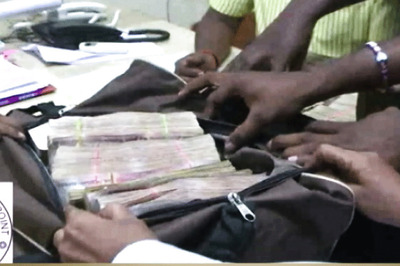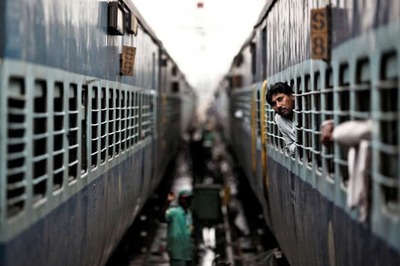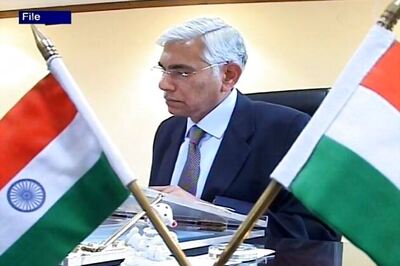
views
The media has almost been put on trial for its coverage of the Arushi Talwar murder case. TV news channels and newspapers have been accused of being insensitive, sensationalist and not reporting the facts. Did the media get it all wrong while reporting the case? What has it learnt from its mistakes? IBNLive readers asked CNN-IBN’s Editor-in-Chief Rajdeep Sardesai in a web chat. The most important lesson learnt: media has the power to make the authorities to act but it can do that without flashing ‘breaking news’ permanently on and reporting just the facts. (Excerpts from the web chat)
Amandeep Singh: I think the media today overreacts . The media is becoming impatient and interfering with the work of the police and investigating agencies. As Uncle Ben tells Spiderman: “with bigger powers come bigger responsibilities.” Was media sensible enough and responsible in the Arushi case?
Rajdeep Sardesai: I think the media was irresponsible in the Arushi case but the prime guilt must lie with the police. It’s the police that claimed Dr Rajesh Talwar was the murderer. Once the police had said that publicly, then the very fact that a father could have murdered his daughter in a middle class home became the kind of story that any media anywhere in the world would latch onto. Having said that, the media did not stick to the facts, but engaged in wild speculation that has no basis in good journalism.
Bala: You are honestly accepting errors but what will you do in the TRP race?
Rajdeep Sardesai: My philosophy is that television is not box office. My self-worth and the image of the channel is not determined by ratings alone, but the quality of the journalism. That is the message we send to every journalist who works at CNN-IBN.
Bobby: Rajdeep, you once claimed that you are after TRP. Now that Arushi case is delivering TRP you have turned around and taken a holier-than-thou stance. Why so? Times came out with apology but CNN-IBN is engaging only in debate. Where is your apology?
Rajdeep Sardesai: Apologise for what? For reporting a police press conference? For reporting what the Noida police claimed was an open and shut case? Let us get rid of this lynch-the media-attitude. A section of the media made mistakes—the challenge is to learn from them.
Dayanand: At around the same time when Arushi killed at her home, 200 people died in a hooch tragedy in Bangalore. That was not at all discussed and followed up . I feel that TV channels are not prioritising news properly. What is your opinion?
Rajdeep Sardesai: The hooch tragedy was a big story, which we covered. Yet, the fact is that it didn’t strike the same chord as a teenage girl being killed in her house. Perhaps, because of the father-daughter relationship we were being confronted with a horrifying 'truth'. The hooch tragedy didn’t have a face to it—Arushi did.
Nishant: Can we trust the media? Whatever it reports, can it be said that it is unbiased and factually verifiable? Take this murder case, one school of thought is that the servants are the culprits while another says that they are being made scapegoats. Channels propagate a different theory every day. Should one issue be given a day-by-day extensive coverage like this, or should one just wait for substantial developments before a report is brought to public domain?
Rajdeep Sardesai: I think at times television news channels need to go beyond the hourly news wheel and step back a bit. We are titillating viewers with morsels of information instead of really informing them.
PAGE_BREAK
Srikant: I have found that Indian media is trying to become like the US or UK tabloid press. Is the Arushi murder the O J Simpson case of India?
Rajdeep Sardesai: The Indian media is going through a period of transition. You are right, the trend towards tabloidisation is growing. But viewers must take some responsibility for this too. We are becoming a voyeuristic society.
Vineet Chandak: Rajdeep, looks like you have got it wrong. If we were voyeuristic society, then so many people would not criticise the media for this coverage and feel disgusted.
Rajdeep Sardesai: That is one way to look at it. The other way is to try and understand why crime, cinema and cricket provide the highest viewership on some news channels.
Manoj Tiwari: This one is for you and CNN-IBN. I understand you have to make news interesting but how come your channel does not want to be a leader when it is development or news from rural areas. I still have to switch to DD channels to look at art, culture, poetry or village related news. Your comments.
Rajdeep Sardesai: I can claim at CNN-IBN with some justification that we haven’t lost our focus on rural India. Having said that, I will concede that we are all 'metro-centric', and that we haven't quite been able to make rural India accessible to a wider audience. In fact, we need to do more positive stories from rural India, rather than see it in stereotypical terms
Radhesh: Why does the media forget that THE story for you is someone else's LIFE. When will learn to respect that?
Rajdeep Sardesai: My prime responsibility as a journalist is to tell a story. My commitment must be to tell that story as honestly as possible. It’s a commitment we have often failed to respect.
Aarvee81: Did CNN-IBN send out a reporter to interview Dr. Rajesh Talwar when he stepped out of the jail? What was the brief given to the reporter? What kind of questions was he asked to throw at the Talwar family? Was the photographer told not to put the camera right under the doctor's nose? Why does the media acts so shabbily when it comes to handling such situations? Did it ever occur to anyone in the media that Dr Talwar is troubled, let us give him a break.
Rajdeep Sardesai: Let’s be less hypocritical. Arushi was a big story; Rajesh Talwar's release was a major photo opportunity. A cameraperson and a reporter are working in tough circumstances—they need the story; they need the pictures. Sure, we could handle it better, but for that it’s not just the journalists who need to learn a few lessons. Those who have to handle such situations could also become more media-savvy.
Shweta Ranjan: The CBI has put the blame on domestic helps but still there is no strong evidence. The more this murder mystery is being investigated , more twisted it is becoming.. Does this show that CBI and our police lack scientific approach to investigation?
Rajdeep Sardesai: I am not a policeman but frankly I am shocked at the manner in which this case has been handled. Investigations are not meant to be a public spectacle, which is what the Arushi case became (and don’t just blame TV channels for that!).
Vishal: Do you think consumerism has hijacked ethical and knowledge-driven journalism?
Rajdeep Sardesai: Why blame consumerism? I think consumerism helped break the government’s monopoly over news because it encouraged viewer choice. The problem is not so much about consumerism; it is a general decline in ethical standards. Having said that I do wish we could be freer of certain competitive pressures.
PAGE_BREAK
Rajeev Singhai: You must accept this: your news channel is doing the same things as others. There are number of thing which are more important but you must introspect how much time your channel has given to murder case.
Rajdeep Sardesai: Let me say this for the umpteenth time: Arushi was a great news story. The challenge for us is different: While Arushi is a big news story, so is drought in Maharashtra.. We need to ensure that we pursue drought in Maharashtra with the same relentlessness that we pursued the Arushi case. Unfortunately, we don’t do that.
V Suresh74: Don't you think the ‘breaking news’ culture among news channels is one-upmanship? Isn’t it better if a channel presents the same news with better input albeit 10 mins late?
Rajdeep Sardesai: The concept of breaking news has broken down on several channels. Its not one-upmanship but reveals a crisis of confidence in our own ability and our journalism.
Renu: I think media today has a dual role: not just in reporting ‘facts’ but ensuring that the facts are from a reliable source. If they just jump the gun to beat other news channels, they are going to lose their face sooner than longer. Than they can sit and compete with all the other reality shows on air today; their credibility as a news channel will be lost. Do you see that happening in the near future?
Rajdeep Sardesai: I think the television media in general is facing a crisis of credibility. However, I do believe there is good media and not so good media. The media still has an important positive role to play in our society. The glass may be half empty, but it is also half full. I still retain the faith.
Shaikh: Don't you think the problem lies in 24X7 news channel? They don't find meaningful content so they telecast irrelevant content and drama to just run their channel 24X7?
Rajdeep Sardesai: You make a good point. I think a 24-hour news channel is a bit like a carnivorous beast that needs to be constantly fed. There is a certain limitation of format that forces us to often pass off trivia as news. This is no excuse though for declining standards.
Seby: Why is Arushi case different from all the other hundreds of murder cases that are happening every single day. Why does the electronic media gives it such a hype when the print media almost ignores it?
Rajdeep Sardesai: Let us not make this a print versus TV debate. The Arushi case is one where both the print and the TV media have much to answer for. Let me also be honest: the Arushi Talwar murder case was a great news story and a great TV story. A father was accused of murdering his daughter, so naturally the media was excited. Where we failed was to understand that the bigger the story, the greater the need to exercise restraint.
Schhaparia: Press and newsmen were the names were used for you guys and you had a very high moral ground in the society. With this story you have shown that at the end of the day you guys are just entertaining people. Social responsibility can go to hell.
Rajdeep Sardesai: I think there is a real danger which you point towards. If news is entertainment, then we live in dangerous times. Again, lets not blame the entire media for this. However, those of us in senior positions must take prime responsibility. We have failed to set an example to the next generation of journalists. Moreover, training systems have weakened considerably.
PAGE_BREAK
Tulika and Rahul Verma: In many nations, the government takes on the role of primary regulator of the media. In India, our solution has been to rely on market forces, competition, responsibility, and a highly evolved set of self-controls that we call journalism ethics. But does a select few in the English media worry about ethics when the main culprit are Hindi news channels?
Rajdeep Sardesai: I think the nature of competition within the Hindi news genre is different. I do believe that there is much that Hindi news channels have to be proud of, there is a passion and an aggression to their journalism that we can’t ignore. Unfortunately, sometimes the aggression is misdirected and the ethical standards are not observed. But let’s not make this a Hindi versus English debate.
D Prasad: Do you admit, Rajdeep, that even your channel did mistakes and are you ready to apologize to the Talwars.
Rajdeep Sardesai: I can say with great pride that at CNN-IBN, we never attempted to concoct facts, or do stories without cross checking on the Talwar case. Having said that, I do believe that we could have handled the story with greater sensitivity. I also feel that the answer is not for the media to apologise to the Talwar family, the bigger question is: when the next time an incident like Arushi happens, will our coverage be any different?
Schhaparia: If police bungles up, you can go to the media or you can go to courts. Where do you go if media distorts the truth? Is there any newsperson who has to guts to show a breaking news in his/her channel that "see, we made a mistake and we are sorry about that.”
Rajdeep Sardesai: You make a good point. There isn’t enough accountability in the media. We ask all other institutions to be accountable, but aren't able to observe the same rules for ourselves.
Kuldeep Gauniyal: First of all let me complement the media for putting the Arushi case on the tract otherwise it would have been derailed by the UP Police.
Rajdeep Sardesai: Thanks! At least, someone out there has a nice word for the media. Yes, the media has plenty to be ashamed of, but I also do believe that the relentless media focus on the Arushi case forced the investigating agencies to hand over the case to the CBI. Just think for a moment of the thousands of Arushi-like cases in this country where this is a miscarriage of justice but because it happens in some remote corner of the country, the perpetrators get away.
Rakesh D: Hi Rajdeep, I have heard you saying “perhaps it is time for media to introspect. Like when Rakhi Sawant’s ‘kiss and tell’ story was presented in on Face the Nation. You have accepted media makes mistakes but how long will such stories appear on TV? I remember six years ago we use to watch our English news channels with great pride and for awareness. Where are we today? Where is the zeal?
Rajdeep Sardesai: I see Rakhi Sawant has become an even bigger star after she appeared on Face the Nation! But honestly let us also not get too judgmental here. Rakhi Sawant is an interesting story but it’s a Page 3 story; we don’t need her on Page 1. Have we lost our zeal? Maybe; we've lost our sense of direction, I fear.




















Comments
0 comment